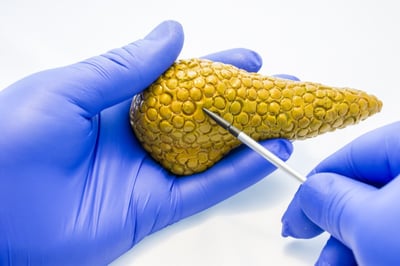Detrás de los titulares sobre el cáncer
Obtener más información sobre el programa de XRAY



Relevancia: Alta
Este artículo es de mayor interés para: Personas con cáncer metastásico o recurrente
Estudio: Pruebas genéticas: recurso necesario para detectar mutaciones hereditarias en personas que padecen cáncer avanzado o metastásico
En un estudio que incluyó a casi 12,000 pacientes con diversos tipos de cáncer, el ocho por ciento de ellos tenían cáncer metastásico y una mutación hereditaria en el gen del cáncer que los calificaba para recibir terapia génica aprobada por la Administración de Alimentos y Medicamentos (FDA, por sus siglas en inglés) o para participar en un estudio clínico. La mayoría de las personas con cáncer metastásico desconocían que tenían una mutación hereditaria y no habían recibido terapia génica a la que posiblemente el tumor hubiera respondido. Los autores del estudio sugieren que las pruebas genéticas para detectar mutaciones hereditarias pueden estar garantizadas para todos los pacientes con cáncer avanzado o metastásico. (publicado el 30/9/21)
Leer más ›


Relevancia: Media-baja
Este artículo es de mayor interés para: Personas que consideren hacerse una biopsia líquida para detectar cáncer
Actualización: Biopsias líquidas para detectar, vigilar y tratar el cáncer
¿Podrá una simple prueba de sangre cambiar el panorama de detección, tratamiento y vigilancia del cáncer? Varias empresas ofrecen una prueba de sangre llamada biopsia líquida para detectar varios tipos de cáncer en las etapas iniciales, ayudar a elegir el mejor tratamiento y vigilar la respuesta al tratamiento. Aunque ha habido grandes avances en el campo de las biopsias líquidas para el tratamiento del cáncer, todavía no se ha demostrado si dichas pruebas pueden detectar la enfermedad a tiempo para salvar vidas. (publicado el 29/9/2021)
Leer más ›


Relevancia: Media
Este artículo es de mayor interés para: Personas sanas con un riesgo promedio de padecer cáncer colorrectal
Estudio: ¿Las bebidas azucaradas aumentan el riesgo de manifestación temprana del cáncer colorrectal?
Un estudio donde participaron enfermeras en los Estados Unidos sugiere que un alto consumo de bebidas endulzadas con azúcar puede aumentar el riesgo de cáncer colorrectal antes de los 50 años de edad. Sin embargo, los investigadores observaron pocos casos de manifestación temprana de cáncer colorrectal, hecho que limitó los resultados. (publicado 21/9/21)
Leer más ›


Relevancia: Media-alta
Este artículo es de mayor interés para: Personas transgénero
Artículo: La perspectiva de las personas transgénero tras ser diagnosticadas con cáncer relacionado con el género
Un artículo de ABC News que ofrece puntos de vista y datos que transmiten el estrés adicional que sufren las personas transgénero e inconformes con su género cuando se les diagnostica cáncer relacionado con el género (p. ej., cáncer de ovario o de próstata) que no coincide con su identidad de género. (publicado el 13/09/21)
Leer más ›


Relevancia: Media-alta
Este artículo es de mayor interés para: Personas con cáncer de mama triple negativo de alto riesgo en etapa inicial
Actualización: Pembrolizumab recibe la aprobación de la FDA para pacientes con cáncer de mama triple negativo en etapa inicial
La Administración de Alimentos y Medicamentos de EE. UU. (FDA, por sus siglas en inglés) aprobó el medicamento de inmunoterapia pembrolizumab (Keytruda) para tratar el cáncer de mama triple negativo en etapa inicial con alto riesgo de recurrencia. Esta es la primera vez que se aprueba un medicamento de este tipo, conocido como inhibidor de puntos de control inmunitario, para tratar el cáncer de mama en etapa inicial. (posted 2/9/21)
Leer más ›


Relevancia: Alta
Este artículo es de mayor interés para: Mujeres con cáncer de mama que consumen café o té.
Estudio: El consumo de café o té puede prolongar la vida después de padecer cáncer de mama
En un estudio donde participaron 8,900 mujeres con cáncer de mama en etapa 1, 2 o 3, aquellas que consumieron café tras recibir un diagnóstico de cáncer de mama, sobrevivieron más tiempo que aquellas que no lo consumieron. El consumo tanto de café como de té se relacionó con una mayor supervivencia independientemente del padecimiento. No obstante, varios factores se relacionaron con un mayor consumo de café o té, así que esta conclusión debe tomarse con cautela. Sin embargo, es posible que los sobrevivientes de cáncer de mama que beben café o té con regularidad encuentren esta investigación reconfortante (publicado el 31/8/21)
Leer más ›


Relevancia: Alta
Este artículo es de mayor interés para: Mujeres blancas y negras no hispanas con cáncer de mama
Estudio: La frecuencia de las mutaciones hereditarias relacionadas con el cáncer de mama es similar en mujeres blancas y negras
El estudio CARRIERS analizó la tasa de mutaciones hereditarias en mujeres con y sin cáncer de mama. En una ampliación del estudio CARRIERS, los investigadores no hallaron diferencias en la frecuencia de mutaciones hereditarias en los genes del cáncer de mama entre las mujeres blancas y negras con cáncer de mama. Unos pocos genes individuales diferían en frecuencia: Las mutaciones BRCA2 y PALB2 se observaron con más frecuencia en las mujeres negras, mientras que las mutaciones CHEK2 se observaron con menos frecuencia. Los investigadores concluyeron que la raza no debe utilizarse para determinar a quién se deriva a las pruebas genéticas. (Publicado el 13/8/21)
Leer más ›


Relevancia: Media-alta
Este artículo es de mayor interés para: Personas con cáncer de mama HER2- en etapa inicial y una mutación hereditaria en los genes BRCA.
Directrices: Las directrices de la ASCO recomiendan olaparib para personas con cáncer de mama en etapa inicial con alto riesgo de recurrencia y una mutación hereditaria en los genes BRCA
La Sociedad Estadounidense de Oncología Clínica (American Society of Clinical Oncology, ASCO) actualizó sus directrices sobre el tratamiento para el cáncer de mama al incluir tratamiento con el inhibidor de la polimerasa poli [adenosina difosfato-ribosa] (PARP, por sus siglas en inglés), olaparib (Lynparza), durante un año tras recibir quimioterapia, radiación o tratamiento quirúrgico (si se recurrió a éstas) para mejorar los resultados de las personas con una mutación hereditaria en los genes BRCA1 o BRCA2 con cáncer de mama HER2- en etapa inicial, con alto riesgo de recurrencia (publicado el 6/8/21).
Actualización: con base en los resultados del Estudio OlympiA, la FDA aprobó olaparib como tratamiento adyuvante para personas con una mutación hereditaria BRCA que han sido diagnosticadas con cáncer de mama HER2-negativo en etapa temprana y tienen un alto riesgo de reincidencia. (11/03/2022)
Leer más ›


Relevancia: Media-alta
Este artículo es de mayor interés para: Mujeres negras que viven en los Estados Unidos.
Actualización: Desigualdades por cáncer de mama en mujeres estadounidenses de raza negra
La Asociación Estadounidense de Investigación Oncológica (AACR, por sus siglas en inglés) publicó un informe en 2020 donde trata el tema de las desigualdades por cáncer entre los grupos raciales y étnicos de los Estados Unidos. En este informe se destacan los resultados sobre la carga del cáncer de mama en mujeres negras. (8/5/21)
Leer más ›


Relevancia: Media-alta
Este artículo es de mayor interés para: Personas con cáncer de páncreas
Artículo: Resumen de las opciones de tratamiento contra el cáncer de páncreas
En esta publicación se evalúan las estrategias actuales de la atención médica contra el cáncer de páncreas y los posibles tratamientos futuros. (publicado el 28/7/21)
Leer más ›